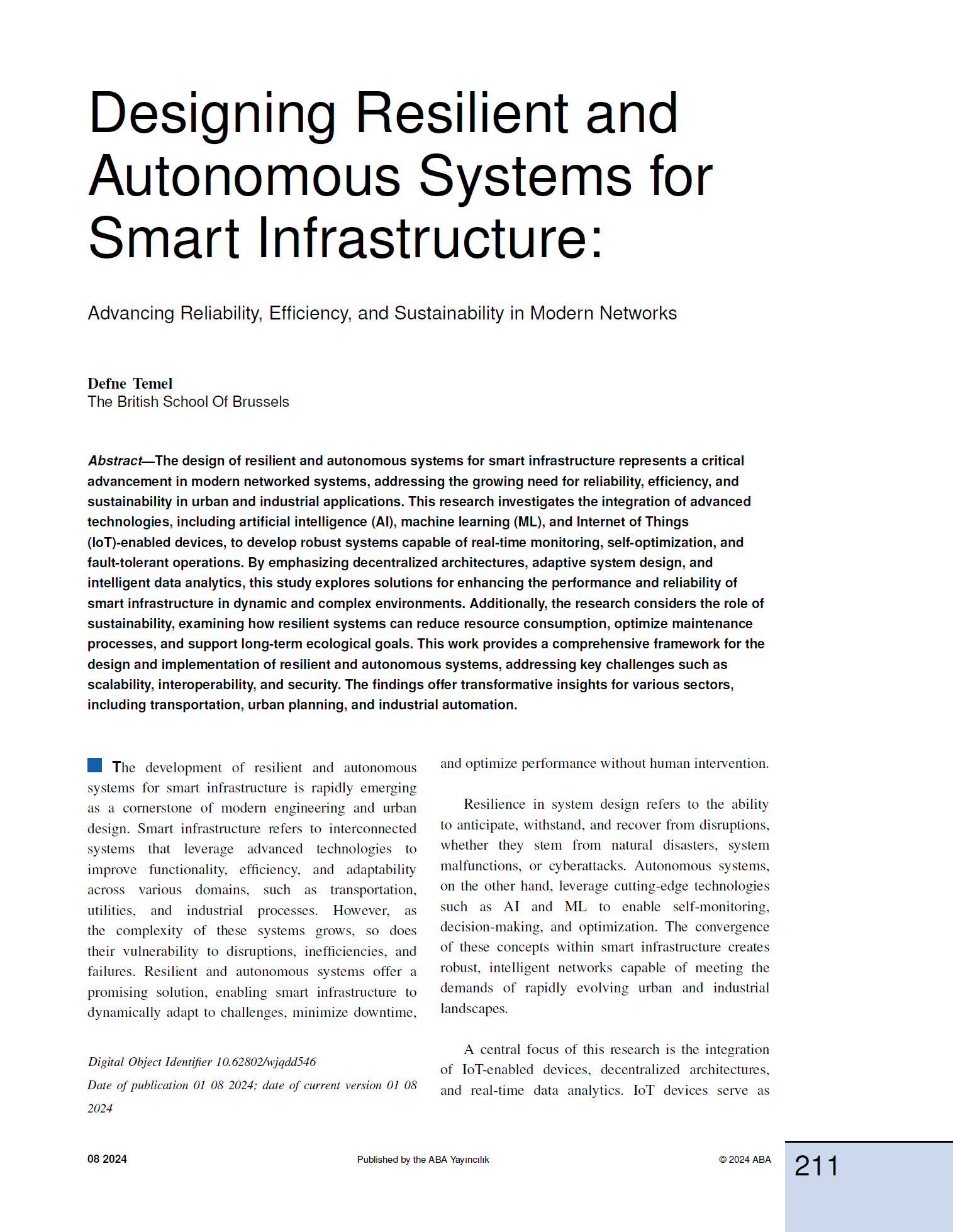Designing Resilient and Autonomous Systems for Smart Infrastructure: Advancing Reliability, Efficiency, and Sustainability in Modern Networks
DOI:
https://doi.org/10.62802/091z1h59Keywords:
Resilient systems, Autonomous systems, Smart infrastructure, Artificial intelligence, Machine learning, IoT, Decentralized architecture, System optimization, Sustainability, Fault tolerance, Smart networksAbstract
The design of resilient and autonomous systems for smart infrastructure represents a critical advancement in modern networked systems, addressing the growing need for reliability, efficiency, and sustainability in urban and industrial applications. This research investigates the integration of advanced technologies, including artificial intelligence (AI), machine learning (ML), and Internet of Things (IoT)-enabled devices, to develop robust systems capable of real-time monitoring, self-optimization, and fault-tolerant operations. By emphasizing decentralized architectures, adaptive system design, and intelligent data analytics, this study explores solutions for enhancing the performance and reliability of smart infrastructure in dynamic and complex environments. Additionally, the research considers the role of sustainability, examining how resilient systems can reduce resource consumption, optimize maintenance processes, and support long-term ecological goals. This work provides a comprehensive framework for the design and implementation of resilient and autonomous systems, addressing key challenges such as scalability, interoperability, and security. The findings offer transformative insights for various sectors, including transportation, urban planning, and industrial automation.
References
Arévalo, P., & Jurado, F. (2024). Impact of artificial intelligence on the planning and operation of distributed energy systems in smart grids. Energies, 17(17), 4501.
Daousis, S., Peladarinos, N., Cheimaras, V., Papageorgas, P., Piromalis, D. D., & Munteanu, R. A. (2024). Overview of Protocols and Standards for Wireless Sensor Networks in Critical Infrastructures. Future Internet, 16(1), 33.
Das, D. K. (2024). Exploring the Symbiotic Relationship between Digital Transformation, Infrastructure, Service Delivery, and Governance for Smart Sustainable Cities. Smart Cities, 7(2), 806-835.
Exner, J. P., & Andres, P. (2024, April). Sustainable Operation of Digital Infrastructure in the Smart City: Practical Experience and Implications. In KEEP ON PLANNING FOR THE REAL WORLD. Climate Change calls for Nature-based Solutions and Smart Technologies. Proceedings of REAL CORP 2024, 29th International Conference on Urban Development, Regional Planning and Information Society (pp. 557-565). CORP–Competence Center of Urban and Regional Planning.
Huda, N. U., Ahmed, I., Adnan, M., Ali, M., & Naeem, F. (2024). Experts and intelligent systems for smart homes’ Transformation to Sustainable Smart Cities: A comprehensive review. Expert Systems with Applications, 238, 122380.
Rane, N., Choudhary, S., & Rane, J. (2024). Artificial intelligence for enhancing resilience. Journal of Applied Artificial Intelligence, 5(2), 1-33.
Sánchez, O., Castañeda, K., Vidal-Méndez, S., Carrasco-Beltrán, D., & Lozano-Ramírez, N. E. (2024). Exploring the influence of linear infrastructure projects 4.0 technologies to promote sustainable development in smart cities. Results in Engineering, 23, 102824.
Velasquez, W., Moreira-Moreira, G. Z., & Alvarez-Alvarado, M. S. (2024). Smart Grids Empowered by Software-Defined Network: A Comprehensive Review of Advancements and Challenges. IEEE Access.









